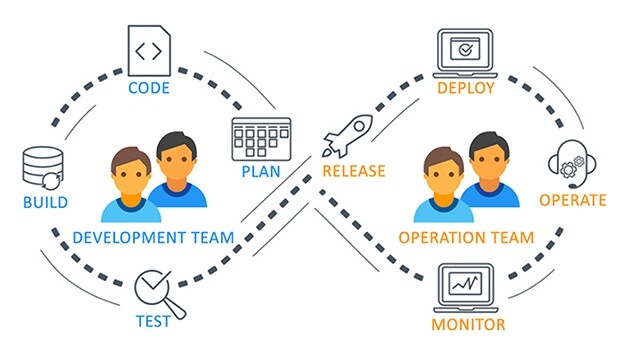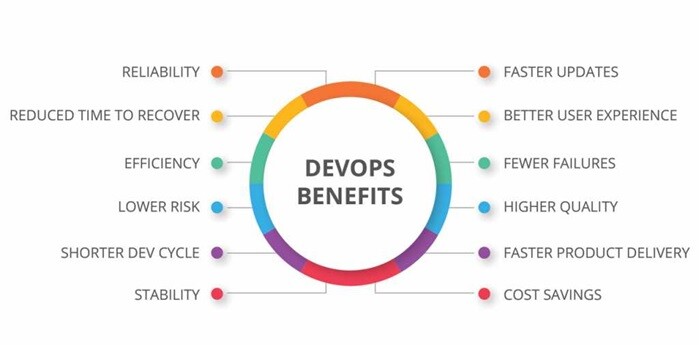In the app modernization process, DevSecOps teams are the new security champions. To avoid...
DevOps in 2023: Compelling Reasons to Learn

DevOps operations have become increasingly important in today’s IT industry and are considered an important aspect of job operations. If someone wants to embark on a career in the IT industry, possessing knowledge about DevOps operations can significantly enhance their career growth, regardless of whether they are a developer, system admin, or security specialist. Due to the shortage of skilled personnel in the industry, this has become one of the most sought-after skills, particularly with the increasing adoption of cloud-based services by companies.
To manage these operations, companies require knowledgeable individuals to monitor the process effectively. According to IT experts, in the near future, a DevOps Developer will be an essential job requirement for companies of all sizes. As a result, most companies have made this model a key business priority and are working towards implementing it in their environment.
Want to know more about DevOps? Visit our course now.
DevOps Developer – A New Job Role
To fully comprehend the DevOps concept, we must first grasp its fundamental idea. DevOps involves combining processes related to software development and IT operations. The primary objective of is to shorten the software development life cycle (SDLC) process and continuously deliver high-quality software. DevOps is considered a burgeoning segment in the future of software development, and many companies are striving to create their software using this approach.

As the demand for DevOps in the IT industry continues to rise, a new job role has emerged known as DevOps Engineers or Developers. These technical professionals foster collaboration between the development team, system admin, and other IT personnel. DevOps Developers possess expertise in multiple automation tools required to manage the entire process in the cloud environment and have a clear understanding of the software development life cycle. Depending on the company’s job requirements, the DevOps engineer may serve in various roles, including project manager, quality testing, software development, automation process execution, and more.
Future of DevOps
DevOps is a rapidly growing field, and its practical applications are expanding daily in the IT industry. Consequently, the demand and opportunities for these engineers are expected to rise in the coming years. This technology is creating new job prospects, and the software development process will rely on the expertise of DevOps professionals. It is safe to say that DevOps will be one of the most in-demand job profiles in the future. The current global IT industry has a high demand for DevOps professionals, and estimations suggest that the need for thsese professionals has increased by around 40 to 45% in the last five years.
DevOps Professionals are poised to be a significant trend in the IT industry’s future, and there are several reasons behind this assertion. Some of these reasons include:
- Software automation is critical for modern businesses, as it provides them with efficient software development processes. Most companies prefer to automate their software development processes to enhance customer experiences and ensure business success.
- The integration testing process in DevOps helps developers identify any issues in the developed code and allows them to resolve those problems before deploying the software in the testing or production environment.
- DevOps methodology is crucial in security because it maintains discipline in terms of plans, policies, and technology. Although DevOps and Security may appear to be distinct, they are intertwined because automating any process comes with the risk of potential problems. Therefore, it is advisable to automate processes only when we can control them. During the implementation, it is essential to consider product security concerns and adhere to all the security protocols associated with the software.
Top 8 Reasons Why should we learn DevOps?
DevOps has emerged as one of the newest technologies in the current IT industry, allowing software developers to collaborate with IT or service team members to efficiently create applications. Nowadays, most software development companies utilize DevOps. The basic concept is similar to the software development process, including services and operations. It facilitates collaboration between development team members and IT operation team members, requiring the use of various tools such as Jenkins, Docker, Puppet, Selenium, Kubernetes, Chef, Ansible, and more. Due to its growing popularity, DevOps has become a critical aspect of the IT sector’s career path, and there are many reasons to learn DevOps today.

- Faster Process Due to Automation – By utilizing DevOps, we can streamline the software development life cycle (SDLC) to ensure timely releases of the product in an agile manner. In the past, the Development and Operations teams used to work in separate silos, making it difficult to determine if the application was ready for operation. However, through this, the two groups work together, resulting in a much faster application development time. This is due to the various phases involved in the DevOps process and the multiple tools used. Through these tools, we can implement the Continuous Integration and Continuous Deployment (CI/CD) process, where any code changes pushed by a developer in the master branch trigger an automatic process to build the application for error-checking purposes. Continuous Deployment can also be implemented if necessary. This is crucial for companies to succeed in today’s highly competitive market. At Amazon, engineers deploy code every 11.7 seconds on average, thanks to the DevOps process.
- Save Time and Cost – DevOps enables companies to save time and reduce costs in the software development process. Typically, software development teams comprise members with varying levels of technical expertise, ranging from excellent to poor. Therefore, identifying and eliminating any erroneous code written by developers during the process is crucial to ensure optimal application performance and user functionality. Fixing issues at a later stage in the development and deployment process requires additional time and resources. However, with DevOps, we can identify and rectify such issues during the development phase, thereby saving time and reducing costs. By limiting the amount of incorrect code and preventing it from moving to the next level, DevOps ensures that the development process is efficient and cost-effective.
- Improve Product Quality – DevOps can boost the efficiency level of developers, resulting in a faster development process and a higher quality product. To enhance product quality and reduce the number of errors before final delivery, we can utilize various tools and processes, such as automated code testing and continuous integration. With each code change push, the continuous integration process runs automatically to detect any system issues resulting from the code changes. By implementing such measures, we can deliver a more error-free and higher-quality application.
- Quick Release Process – DevOps can foster an improved software development culture within a team. Through this approach, the development and operational teams collaborate to achieve a unified goal, resulting in faster and more efficient outcomes. This allows the team to concentrate on delivering the product in a timely manner. Furthermore, after deployment, the team can gather feedback from stakeholders and end-users and incorporate their suggestions to make necessary changes and re-release the product.
- Lower Chance of Failure – Short development cycles in DevOps help identify defects in the code through frequent code release builds, reducing the chance of deployment failure. Programmatic errors in the application are often the main reason behind deployment failure.
- New Career Job Role – These days, DevOps is a highly sought-after technology in the job market, and there is a significant demand for technical professionals with DevOps-related skills. However, currently, there is a shortage of qualified individuals who can take on the roles and responsibilities of a DevOps professional. This presents a significant opportunity for anyone interested in becoming a DevOps professional to secure a promising job role.
- High PayScale for DevOps Professionals – DevOps professionals are currently offered higher salary packages than other job roles with the same level of experience in the industry.
- Expertise in multiple technical tools – The DevOps process comprises several phases that require the use of various technical tools. This approach enables us to have better command and proficiency over a wide range of tools, including:
- Git
- Jenkins
- Docker
- Kubernetes
- Selenium
- Puppet
- Ansible
- Chef
- And many more
Summary
With the rapid evolution of technology, it’s essential for developers, system engineers, and administrators to keep up with the latest advancements. Learning DevOps in 2023 is an excellent way to stay ahead of the game and acquire a range of valuable skills that can enhance one’s competitiveness in the job market. By mastering this, individuals can gain the necessary knowledge to develop cutting-edge applications and promote collaboration between different IT departments, leading to optimal development processes. Moreover, it can also potentially lower costs for organizations by improving efficiency and communication among technical teams.
Here at CourseMonster, we know how hard it may be to find the right time and funds for training. We provide effective training programs that enable you to select the training option that best meets the demands of your company.
For more information, please get in touch with one of our course advisers today or contact us at training@coursemonster.com
